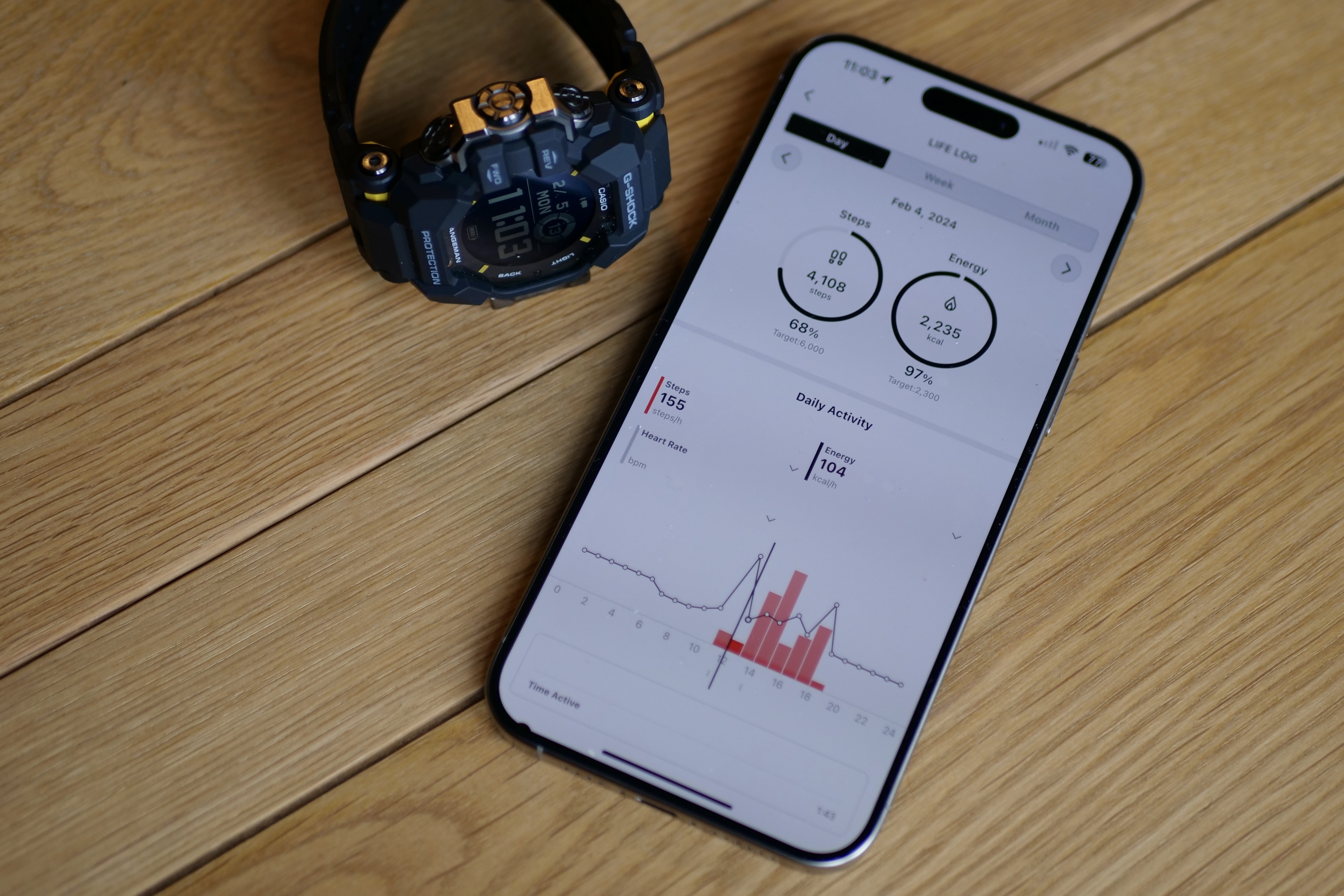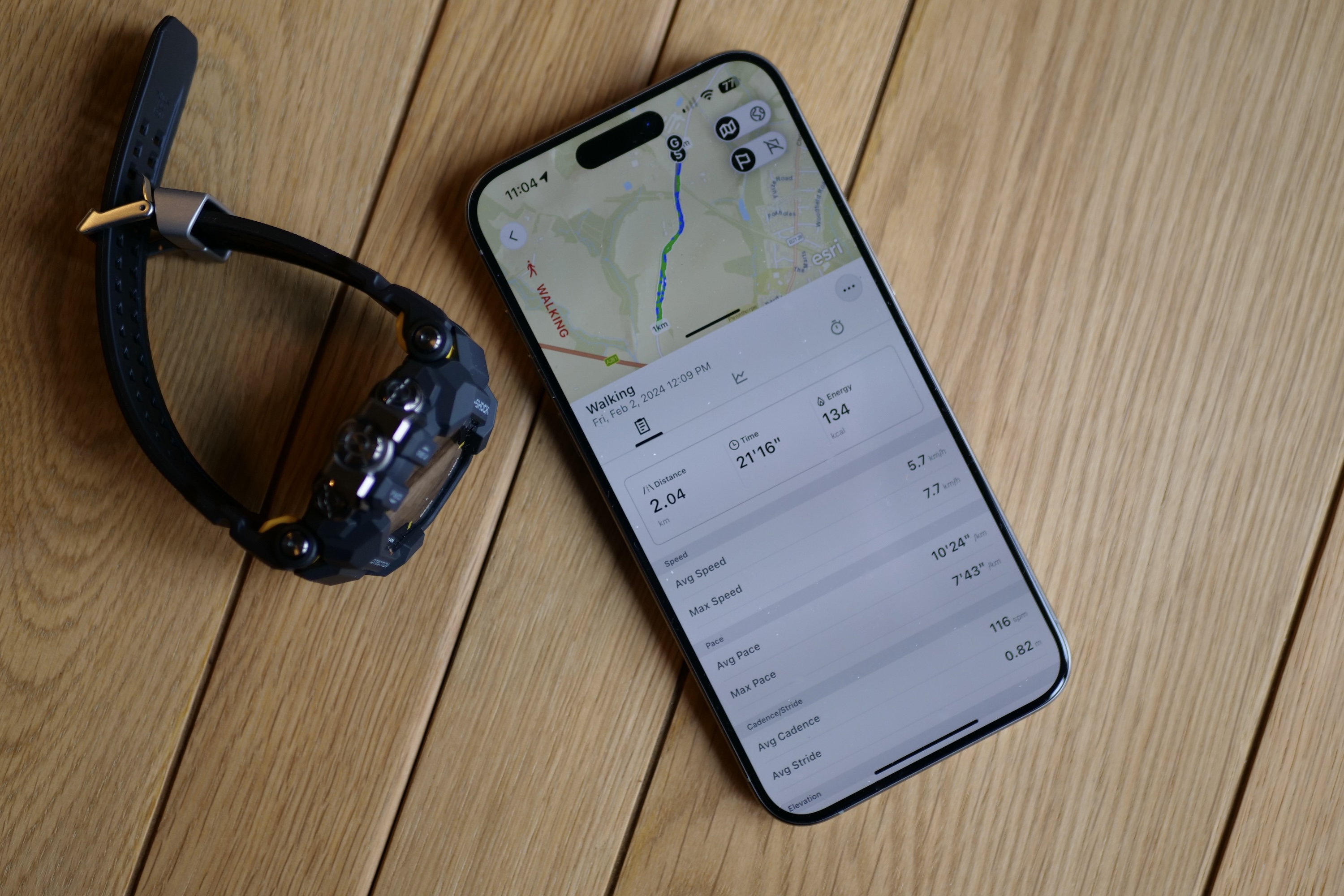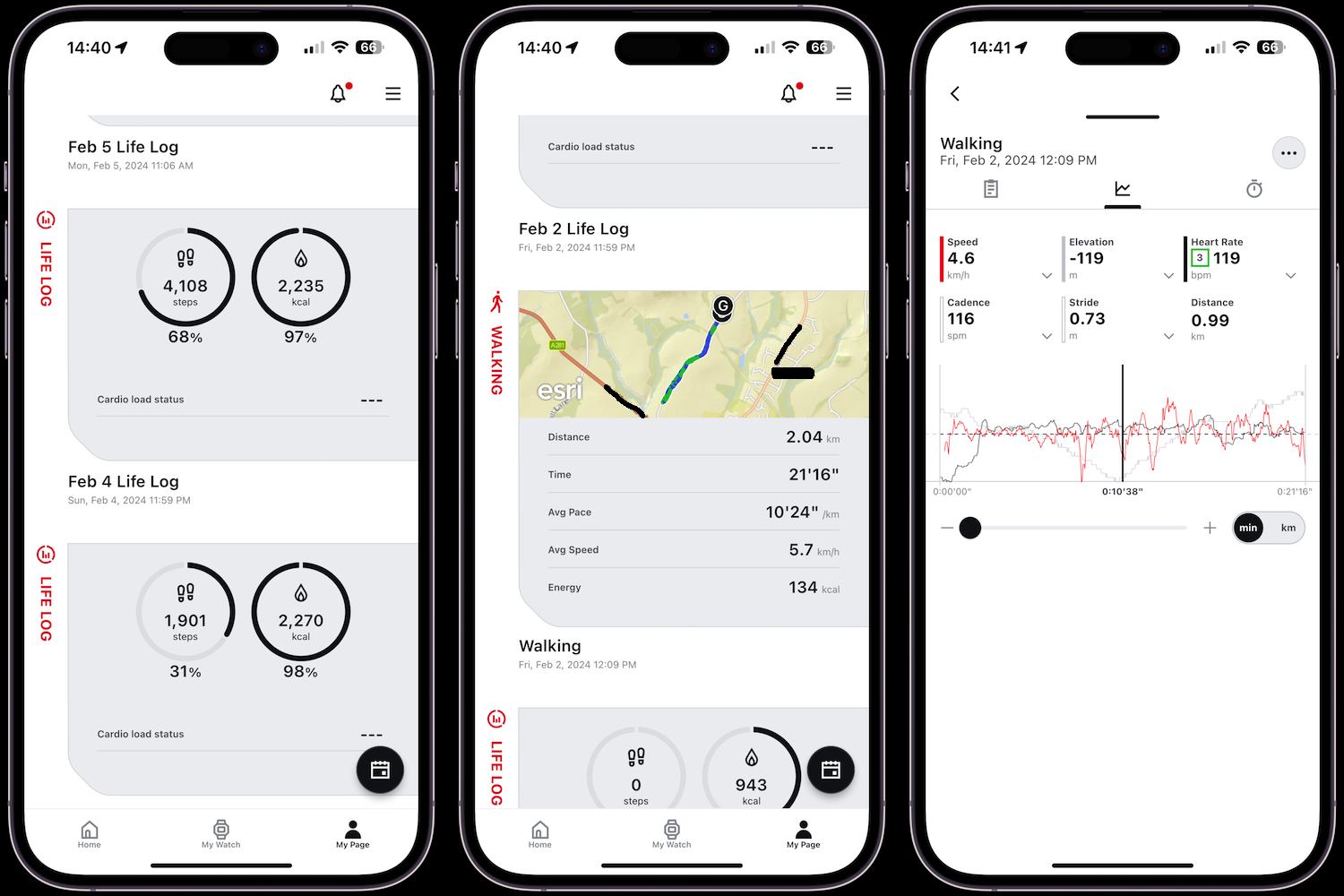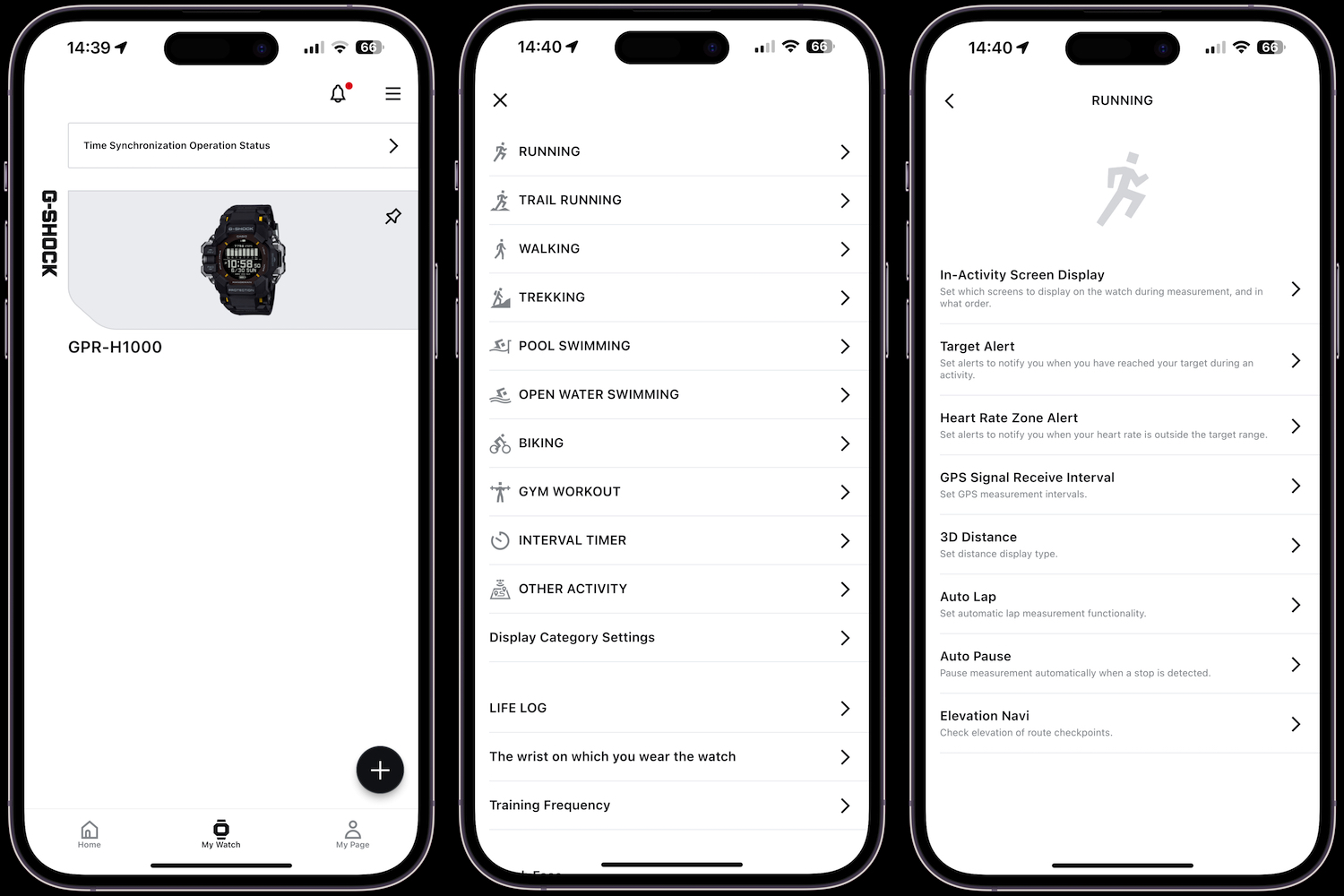I tested G-Shock’s new Apple Watch Ultra killer, and it’s great
Casio G-Shock GPR-H1000 Rangeman
MSRP $500.00
“The Casio G-Shock GPR-H1000 Rangeman is a brilliant hybrid smartwatch.”
Pros
- Surprisingly comfortable
- Very durable and tough
- Solar and USB charging
- Software isn’t intrusive
Cons
- No sapphire crystal
- Much too big for sleep tracking
The more I wear and use Casio’s fully connected G-Shock watches, the more I think they are the ideal casual smartwatch. The most recent watch on my wrist is the G-Shock GPR-H1000 Rangeman, and it’s very different from the GPR-B1000 Rangeman I wore in 2018, which was so heavy that it was practically unmanageable.
Just like the Rangeman watch, Casio has evolved since then, and we should consider its connected watches serious competitors to the Apple Watch Ultra 2 and the Samsung Galaxy Watch 5 Pro, along with Garmin and Polar’s sports watches.
Why is the Rangeman a casual smartwatch?
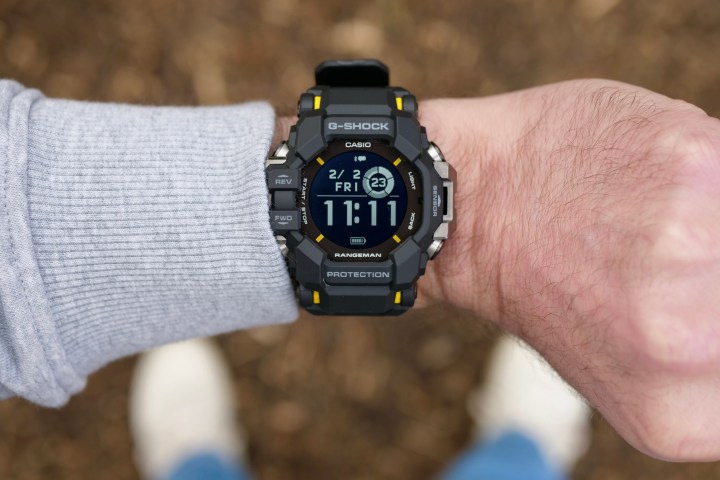
The Rangeman is a great example of a casual smartwatch, by which I mean watches that don’t really need to be worn 24 hours a day to get all the benefits from them, and it’s a segment Casio has perfected with its connected G-Shock range. The thing with an Apple Watch Series 9, Galaxy Watch 6, or a Fitbit is they truly need to be worn all the time to get the best from the software and health-tracking abilities. I don’t always want to wear one of these models, but I also don’t want to miss out on notifications, which is where a watch like the Rangeman fits in.
It’s made for the outdoors, but unlike the similar G-Shock Mudman I wore recently, it has all the connected features you could want. It uses the same platform as the G-Shock GBD-H2000, so it maintains a Bluetooth connection to your phone, delivers notifications, and tracks workouts with its heart rate and blood oxygen monitor. It has a built-in GPS, a compass, an altimeter, a barometer, and a tide graph. If that wasn’t enough, it also connects to Apple Health, Google Fit, and Strava. It’s a comprehensive mix of what makes the Apple Watch Ultra 2 or a Garmin smartwatch tempting, just with G-Shock’s trademark design and toughness and without having to make the same level of commitment.
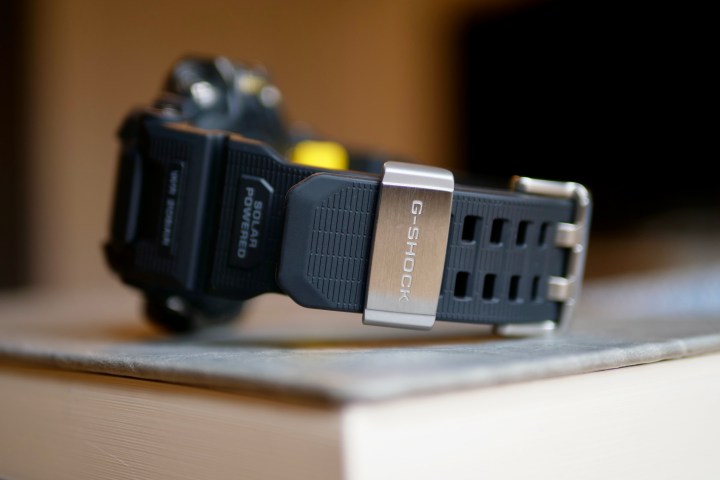
I don’t feel tied to the G-Shock Rangeman. If I decide not to wear it, it’s fine. There’s no pressure involved, as it does not send constant reminders to move around or push me to meet any targets, so I don’t feel guilty when I do put it back on. When I go back to it, it’s because I want to wear it, and when I put it on, I love the way it looks and makes me feel. A s much as I like the Apple Watch Series 9 and the Apple Watch Ultra — and appreciate how watch-like they are (for smartwatches) — I rarely get the urge to wear them in the same way I do with a traditional watch.
It’s a wonderful mix you don’t find in many other places.
Casio has refined its connected platform a great deal over the past few years, going from basic connected features like a phone finder to what we have now, which is a series of exercise-tracking features, informative metrics, and notification support that rivals sports smartwatches from Polar and Garmin. It has experimented with Wear OS, but its own software is far more fitting because it avoids the aforementioned daily smartwatch grind. It’s a wonderful mix you don’t find in many other places, and the Rangeman is perhaps the ultimate expression of it at the moment.
What it’s like wearing the Rangeman

The Rangeman isn’t a small watch. It’s a big, serious, imposing tool watch, and you need to be pretty confident to wear it. At 53mm wide and 20mm tall, it doesn’t fit under a shirt cuff and is more comfortable worn with your sleeve behind it, so you can show the watch off to the world. It comes in the ordinary black color seen in our photos or a very bright yellow if you don’t think the size of the watch will make it stand out enough.
What I love about the Rangeman (and G-Shock watches in general) is there’s a reason for a lot of the design choices. For example, the metal guards at three and nine o’clock provide protection for the main button and the sensor and GPS array, while all the other buttons are sealed into the case with special gaskets to keep out mud, dust, and other harmful materials. And the resin case and specially designed interior make the watch shock-resistant and water-resistant to 200 meters.

But even at this size and with all this toughness, the Rangeman is not uncomfortable to wear. It’s just 92 grams, which is a touch lighter than an Apple Watch Ultra 2 with a band attached. The bio-resin strap on the Rangeman is very flexible and forgiving, and the huge metal keeper never catches on wrist hair. For such a massive watch, the Rangeman does a surprisingly good job of not being irritating on your wrist. I love some of the little design touches too, such as the Rangeman’s trademark wildcat logo on the underneath of the strap.
What’s not so good? It’s mineral glass over the screen. At this price and with it being part of G-Shock’s prestigious Master of G product line, I’d have liked sapphire crystal to give it additional scratch protection. It’s also not suited to wearing overnight for sleep tracking, despite having the right technology to do so. But provided you’re aware of the compromises you’ll have to make in your attire to comfortably wear the Rangeman, it’s hard to point out much that’s bad about it. Casio has been making giant G-Shocks for 40 years, so it knows how to make a good one. It really shows with the Rangeman.
Casio included plenty of technology

The G-Shock GPR-H1000 doesn’t run Google’s Wear OS; instead, it uses Casio’s own proprietary operating system, which is operated using the buttons on the case and not a touchscreen. It has a heart rate monitor on the back and will track different exercises — from walking, running, and cycling to swimming and gym workouts — plus it monitors blood oxygen levels. The data collected is collated using algorithms from outdoor specialists Polar and presented in the Casio Watches app. It measures everything from cardio load to stride and Swolf (a composite measurement in sports swimming).
If you’ve been following Casio’s connected G-Shock range, this may all sound familiar, as these are the same features offered by the GBD-H2000 watch. Does this mean the two are the same? Not quite. Casio uses different modules — the name given to the central brain or movement of a G-Shock — identified by a reference number. Inside the GPR-H1000 Rangeman is the 3554 module, but inside the GBD-H2000 is the 3515 module. The only difference I can see is the Rangeman gets mud resistance and a tide graph; the connected and exercise features appear to be identical.
The emphasis is on walking, running, cycling, and trekking, with the majority of the in-depth data covering those activities. It’s simple to start tracking a workout, as the watch pulls in a GPS signal within a minute, and the data shown in the Casio Watches app is comprehensive. This isn’t a tracker for anyone who wants a lot of motivation, though, as it presents rather than analyzes the data. Again, it’s a great casual smartwatch, but there’s enough depth and functionality (you can activate movement reminders and so on if you like, but they are off by default) to make the Rangeman worth wearing.
I went into detail about how a connected G-Shock watch tracked exercise and also how the Casio Watches app worked when I reviewed the GBD-H2000; I suggest taking a look at that review for a more in-depth examination. But what you need to know is that it’s all very easy to use, the button sequences are simple to learn, the screen is bright and responds quickly to actions, and the backlight really shines in the dark. I’ve had the watch connected to an Apple iPhone 15 Pro Max, and it has been very reliable and the Casio Watches app has steadily improved, too, once I got used to the slightly frustrating layout. It’s also available for Android.
Two easy ways to charge the watch

Wearing the GPR-H1000 Rangeman outside your sleeve has a benefit in addition ti comfort. The watch is solar-powered, and by letting it see the sun, it may never need to be charged up any other way. If you use the GPS or heart rate monitoring feature every day or for an extended period of time, it may not be able to keep up, though. For those times, you can use the included charging cable.
It has a clever oversize crocodile clip-style design, making it impossible to not properly align on the watch’s body and charging pins, it doesn’t obscure the watch face when its attached, and it works from a battery pack so it can be used when you’re not near a plug socket. Casio estimates about two months of use from the battery without using the heart rate sensor and seeing sunlight at all, with about 14 hours possible when using the heart rate sensor continuously during intensive, extended activity.

The convenience of not having to constantly recharge the watch is another reason the Rangeman is great for casual wear, as it will almost certainly still be working when you go to put it on, even if you haven’t worn if for weeks.
How much does the Casio G-Shock GPR-H1000 cost?

The GPR-H1000 Rangeman costs $500 in either the black or yellow color scheme and is available directly through Casio’s G-Shock online store and retailers now. In the U.K., the watch costs 450 British pounds.
This makes it $100 more expensive than the GBD-H2000, an arguably much more wearable and fashion-focused connected G-Shock. It’s a genuine alternative to the Rangeman, and aside from a few small differences, your decision will likely be led by which design you prefer. If you don’t care about the connected features and want a tough G-Shock for some rough-and-tumble activities, the GW-9500 Mudman may suit you too.

However, neither fits into the prestigious Master of G range, so they lack the cache of the Rangeman. For those new to G-Shock, Master of G watches are designed for professionals and specific activities, with the outdoor Rangeman and Mudmaster joining the aviation-based Gravitymaster and the diving-focused Frogman.
The Rangeman costs less than the $799 Apple Watch Ultra 2, but more than the $400 Apple Watch Series 9 and the $280 Samsung Galaxy Watch 6. It’s also a lot more than the excellent Fitbit Charge 6 and a lot less than the Garmin Epix Pro Gen 2. However, it’s a very different watch compared to all these models, which absolutely need to be worn all the time if you’re going to get the most from them.
A smartwatch you don’t have to wear all the time

Casio has refined its app, made the right move by getting Polar on board to deal with the workout data, and made its on-watch software as simple as possible while still only using physical buttons. Its connected G-Shock watches are the best they’ve ever been, and now fill the gap between wearing a non-connected watch and a smartwatch perfectly.
The new Rangeman is a brilliant blend of both G-Shock and smartwatch worlds.
The Rangeman, like the GBD-H2000, is a true hybrid smartwatch that rivals the Withings ScanWatch 2, but without the guilty feeling that you’re missing out on “valuable” data if you decide to wear something else instead. The Rangeman’s size and weight don’t really make you want to wear it all the time anyway, but for once, this isn’t really a negative.
Call it what you like: A casual smartwatch, a hybrid smartwatch, a smartwatch for people who hate smartwatches — it doesn’t matter. The new Rangeman is a brilliant blend of both G-Shock and smartwatch worlds, bringing most of the good things together without the one thing that puts many watch enthusiasts off: a necessity to only ever wear one watch.
Editors’ Recommendations
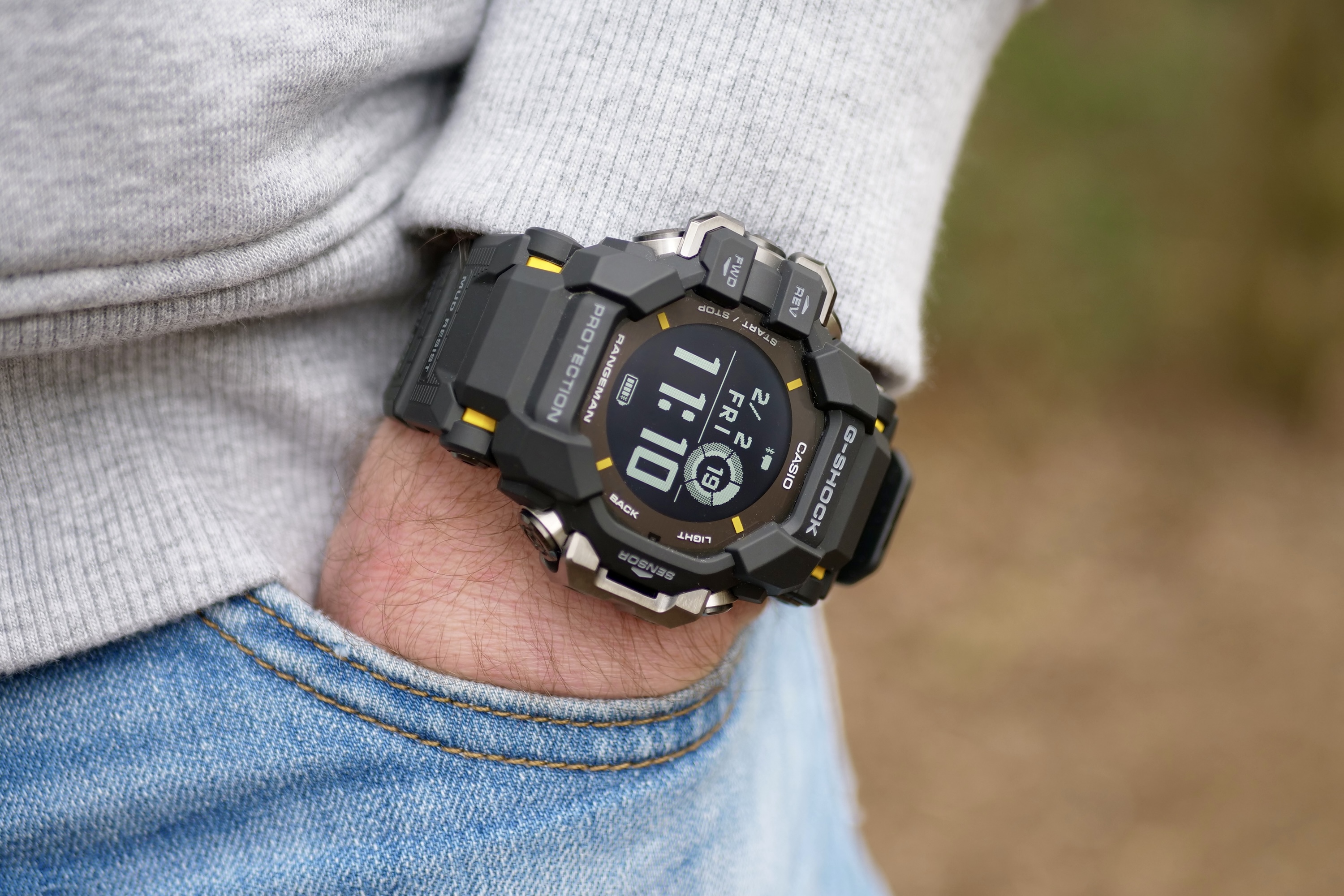
Casio G-Shock GPR-H1000 Rangeman
MSRP $500.00
“The Casio G-Shock GPR-H1000 Rangeman is a brilliant hybrid smartwatch.”
Pros
- Surprisingly comfortable
- Very durable and tough
- Solar and USB charging
- Software isn’t intrusive
Cons
- No sapphire crystal
- Much too big for sleep tracking
The more I wear and use Casio’s fully connected G-Shock watches, the more I think they are the ideal casual smartwatch. The most recent watch on my wrist is the G-Shock GPR-H1000 Rangeman, and it’s very different from the GPR-B1000 Rangeman I wore in 2018, which was so heavy that it was practically unmanageable.
Just like the Rangeman watch, Casio has evolved since then, and we should consider its connected watches serious competitors to the Apple Watch Ultra 2 and the Samsung Galaxy Watch 5 Pro, along with Garmin and Polar’s sports watches.
Why is the Rangeman a casual smartwatch?

The Rangeman is a great example of a casual smartwatch, by which I mean watches that don’t really need to be worn 24 hours a day to get all the benefits from them, and it’s a segment Casio has perfected with its connected G-Shock range. The thing with an Apple Watch Series 9, Galaxy Watch 6, or a Fitbit is they truly need to be worn all the time to get the best from the software and health-tracking abilities. I don’t always want to wear one of these models, but I also don’t want to miss out on notifications, which is where a watch like the Rangeman fits in.
It’s made for the outdoors, but unlike the similar G-Shock Mudman I wore recently, it has all the connected features you could want. It uses the same platform as the G-Shock GBD-H2000, so it maintains a Bluetooth connection to your phone, delivers notifications, and tracks workouts with its heart rate and blood oxygen monitor. It has a built-in GPS, a compass, an altimeter, a barometer, and a tide graph. If that wasn’t enough, it also connects to Apple Health, Google Fit, and Strava. It’s a comprehensive mix of what makes the Apple Watch Ultra 2 or a Garmin smartwatch tempting, just with G-Shock’s trademark design and toughness and without having to make the same level of commitment.

I don’t feel tied to the G-Shock Rangeman. If I decide not to wear it, it’s fine. There’s no pressure involved, as it does not send constant reminders to move around or push me to meet any targets, so I don’t feel guilty when I do put it back on. When I go back to it, it’s because I want to wear it, and when I put it on, I love the way it looks and makes me feel. A s much as I like the Apple Watch Series 9 and the Apple Watch Ultra — and appreciate how watch-like they are (for smartwatches) — I rarely get the urge to wear them in the same way I do with a traditional watch.
It’s a wonderful mix you don’t find in many other places.
Casio has refined its connected platform a great deal over the past few years, going from basic connected features like a phone finder to what we have now, which is a series of exercise-tracking features, informative metrics, and notification support that rivals sports smartwatches from Polar and Garmin. It has experimented with Wear OS, but its own software is far more fitting because it avoids the aforementioned daily smartwatch grind. It’s a wonderful mix you don’t find in many other places, and the Rangeman is perhaps the ultimate expression of it at the moment.
What it’s like wearing the Rangeman

The Rangeman isn’t a small watch. It’s a big, serious, imposing tool watch, and you need to be pretty confident to wear it. At 53mm wide and 20mm tall, it doesn’t fit under a shirt cuff and is more comfortable worn with your sleeve behind it, so you can show the watch off to the world. It comes in the ordinary black color seen in our photos or a very bright yellow if you don’t think the size of the watch will make it stand out enough.
What I love about the Rangeman (and G-Shock watches in general) is there’s a reason for a lot of the design choices. For example, the metal guards at three and nine o’clock provide protection for the main button and the sensor and GPS array, while all the other buttons are sealed into the case with special gaskets to keep out mud, dust, and other harmful materials. And the resin case and specially designed interior make the watch shock-resistant and water-resistant to 200 meters.

But even at this size and with all this toughness, the Rangeman is not uncomfortable to wear. It’s just 92 grams, which is a touch lighter than an Apple Watch Ultra 2 with a band attached. The bio-resin strap on the Rangeman is very flexible and forgiving, and the huge metal keeper never catches on wrist hair. For such a massive watch, the Rangeman does a surprisingly good job of not being irritating on your wrist. I love some of the little design touches too, such as the Rangeman’s trademark wildcat logo on the underneath of the strap.
What’s not so good? It’s mineral glass over the screen. At this price and with it being part of G-Shock’s prestigious Master of G product line, I’d have liked sapphire crystal to give it additional scratch protection. It’s also not suited to wearing overnight for sleep tracking, despite having the right technology to do so. But provided you’re aware of the compromises you’ll have to make in your attire to comfortably wear the Rangeman, it’s hard to point out much that’s bad about it. Casio has been making giant G-Shocks for 40 years, so it knows how to make a good one. It really shows with the Rangeman.
Casio included plenty of technology

The G-Shock GPR-H1000 doesn’t run Google’s Wear OS; instead, it uses Casio’s own proprietary operating system, which is operated using the buttons on the case and not a touchscreen. It has a heart rate monitor on the back and will track different exercises — from walking, running, and cycling to swimming and gym workouts — plus it monitors blood oxygen levels. The data collected is collated using algorithms from outdoor specialists Polar and presented in the Casio Watches app. It measures everything from cardio load to stride and Swolf (a composite measurement in sports swimming).
If you’ve been following Casio’s connected G-Shock range, this may all sound familiar, as these are the same features offered by the GBD-H2000 watch. Does this mean the two are the same? Not quite. Casio uses different modules — the name given to the central brain or movement of a G-Shock — identified by a reference number. Inside the GPR-H1000 Rangeman is the 3554 module, but inside the GBD-H2000 is the 3515 module. The only difference I can see is the Rangeman gets mud resistance and a tide graph; the connected and exercise features appear to be identical.
The emphasis is on walking, running, cycling, and trekking, with the majority of the in-depth data covering those activities. It’s simple to start tracking a workout, as the watch pulls in a GPS signal within a minute, and the data shown in the Casio Watches app is comprehensive. This isn’t a tracker for anyone who wants a lot of motivation, though, as it presents rather than analyzes the data. Again, it’s a great casual smartwatch, but there’s enough depth and functionality (you can activate movement reminders and so on if you like, but they are off by default) to make the Rangeman worth wearing.
I went into detail about how a connected G-Shock watch tracked exercise and also how the Casio Watches app worked when I reviewed the GBD-H2000; I suggest taking a look at that review for a more in-depth examination. But what you need to know is that it’s all very easy to use, the button sequences are simple to learn, the screen is bright and responds quickly to actions, and the backlight really shines in the dark. I’ve had the watch connected to an Apple iPhone 15 Pro Max, and it has been very reliable and the Casio Watches app has steadily improved, too, once I got used to the slightly frustrating layout. It’s also available for Android.
Two easy ways to charge the watch

Wearing the GPR-H1000 Rangeman outside your sleeve has a benefit in addition ti comfort. The watch is solar-powered, and by letting it see the sun, it may never need to be charged up any other way. If you use the GPS or heart rate monitoring feature every day or for an extended period of time, it may not be able to keep up, though. For those times, you can use the included charging cable.
It has a clever oversize crocodile clip-style design, making it impossible to not properly align on the watch’s body and charging pins, it doesn’t obscure the watch face when its attached, and it works from a battery pack so it can be used when you’re not near a plug socket. Casio estimates about two months of use from the battery without using the heart rate sensor and seeing sunlight at all, with about 14 hours possible when using the heart rate sensor continuously during intensive, extended activity.

The convenience of not having to constantly recharge the watch is another reason the Rangeman is great for casual wear, as it will almost certainly still be working when you go to put it on, even if you haven’t worn if for weeks.
How much does the Casio G-Shock GPR-H1000 cost?

The GPR-H1000 Rangeman costs $500 in either the black or yellow color scheme and is available directly through Casio’s G-Shock online store and retailers now. In the U.K., the watch costs 450 British pounds.
This makes it $100 more expensive than the GBD-H2000, an arguably much more wearable and fashion-focused connected G-Shock. It’s a genuine alternative to the Rangeman, and aside from a few small differences, your decision will likely be led by which design you prefer. If you don’t care about the connected features and want a tough G-Shock for some rough-and-tumble activities, the GW-9500 Mudman may suit you too.

However, neither fits into the prestigious Master of G range, so they lack the cache of the Rangeman. For those new to G-Shock, Master of G watches are designed for professionals and specific activities, with the outdoor Rangeman and Mudmaster joining the aviation-based Gravitymaster and the diving-focused Frogman.
The Rangeman costs less than the $799 Apple Watch Ultra 2, but more than the $400 Apple Watch Series 9 and the $280 Samsung Galaxy Watch 6. It’s also a lot more than the excellent Fitbit Charge 6 and a lot less than the Garmin Epix Pro Gen 2. However, it’s a very different watch compared to all these models, which absolutely need to be worn all the time if you’re going to get the most from them.
A smartwatch you don’t have to wear all the time

Casio has refined its app, made the right move by getting Polar on board to deal with the workout data, and made its on-watch software as simple as possible while still only using physical buttons. Its connected G-Shock watches are the best they’ve ever been, and now fill the gap between wearing a non-connected watch and a smartwatch perfectly.
The new Rangeman is a brilliant blend of both G-Shock and smartwatch worlds.
The Rangeman, like the GBD-H2000, is a true hybrid smartwatch that rivals the Withings ScanWatch 2, but without the guilty feeling that you’re missing out on “valuable” data if you decide to wear something else instead. The Rangeman’s size and weight don’t really make you want to wear it all the time anyway, but for once, this isn’t really a negative.
Call it what you like: A casual smartwatch, a hybrid smartwatch, a smartwatch for people who hate smartwatches — it doesn’t matter. The new Rangeman is a brilliant blend of both G-Shock and smartwatch worlds, bringing most of the good things together without the one thing that puts many watch enthusiasts off: a necessity to only ever wear one watch.
Editors’ Recommendations

